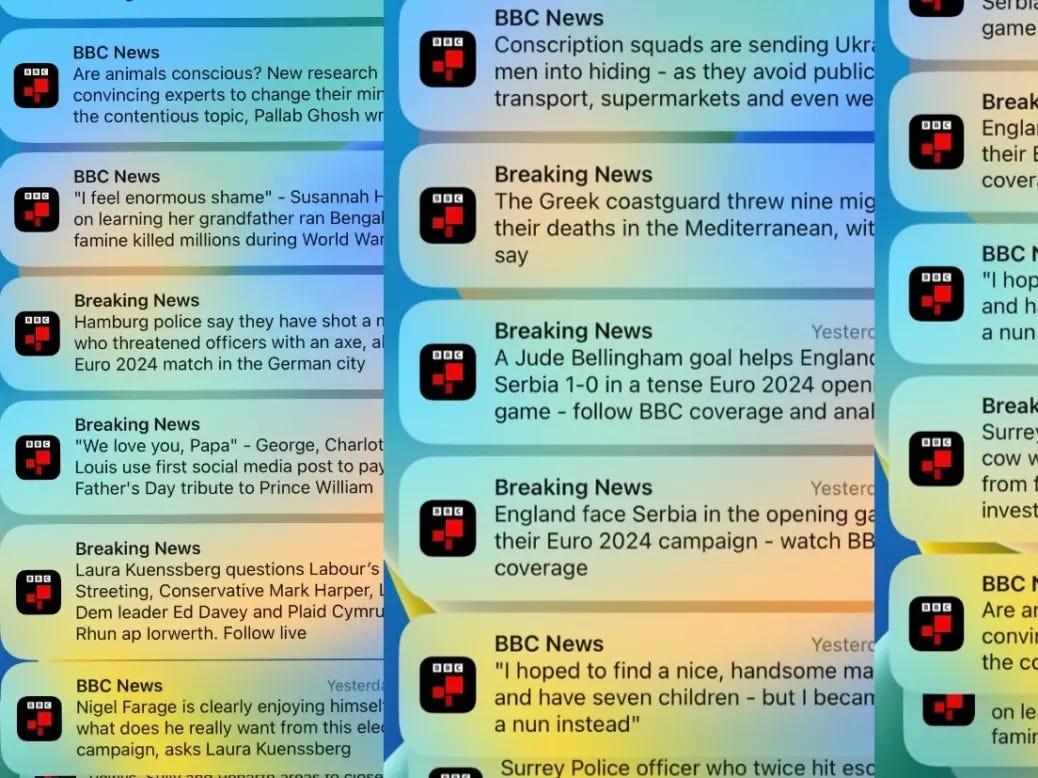Front page election bias tracked | BBC push notifications analysed
And could AI help local news more than harm?
Welcome to your daily newsletter from Press Gazette on Tuesday 18 June.
If you have yet to get your entry in for our Future of Media Awards, worry not - the deadline has been extended, so we will still accept entries this week.
If you want to know what a newspaper is really thinking, look at the front page.
The choice and treatment of front page stories is the best indication of where a title's bias lies.
Whilst some UK national newspapers strive to be politically neutral, such as the i, most choose to take a position on political issues.
If Keir Starmer's Labour had feared a backlash from the traditionally Tory press, at this halfway point in the campaign they can breathe a sigh of relief. Press Gazette has looked at all the front pages from UK national newspapers published since the election was called and found a roughly even split between stories which will have made Rishi Sunak smile and those which will have furrowed his brow.
Perhaps most interesting is the allegiance of The Sun, the UK's most widely read commercial newsbrand. It has been pro-Tory since 2009 but has had very little to say about the general election on its front page so far, with just one pro-Conservative and one anti-Conservative story making the splash over the last three weeks.
The Sun may be yet to make a formal election endorsement, but it has already voted with its front page to support ‘none of the above’.
We've also taken a closer look at BBC push notifications during the general election to understand more about their frequency and substance.
These mobile phone alerts go out to around seven million people, sometimes as often as 12 times a day. They are probably one of the most influential news platforms in the country, so well worthy of scrutiny.
As an aside, the BBC refuses to publish a record of its push notifications publicly anywhere (despite their huge influence), so we have had to piece them together from other sources.
Finally, we have a comment piece looking at AI and the local news business, explaining why the technology may be more of an opportunity than a threat for this hard-pressed sector.
New from Press Gazette
Tories have slight lead versus Labour… on BBC general election push notifications
Of the more than 170 notifications sent since Rishi Sunak announced the dissolution of Parliament last month, some 39% discussed the election, a political party or politician or a political issue directly linked to the vote.
Has Rishi Sunak already lost support of The Sun? Press general election bias tracked
Of the 246 front pages we looked at 56 were judged to be positive for Rishi Sunak, 57 negative for him and 132 were neutral.
How generative AI can help local newspapers survive
“Publishers should definitely implement their own customised large language models (LLMs) instead of just using general models without any fine-tuning. Just building your strategy on OpenAI and GPT will not be enough in the future.”
Sponsored: Pugpig named best media technology partner of 2024 by AOP
The team of 31 industry expert judges looked for entries that could demonstrate an effective contribution to the business of their online publisher clients. Judges were after evidence of a real impact on business efficiency and bottom line.
News in brief
Up to 150 jobs could be cut as a result of Evening Standard going from daily to weekly - about 70 from the newsroom. (Press Gazette)
LBC’s overnight election coverage is to be led by Andrew Marr and Shelagh Fogarty alongside two of the three hosts of The News Agents, Jon Sopel and Lewis Goodall. Emily Maitlis will be helping to present coverage on Channel 4. (Press Gazette)
Media policies in the Reform UK manifesto: the party has proposed a Free Speech Bill, an end to the BBC licence fee and reform of social media regulation. (Press Gazette)
Ofcom has revealed its 10 most complained about programmes of all time, led by Piers Morgan talking about Meghan Markle on Good Morning Britain in 2021, which received 54,595 complaints. Julia Hartley-Brewer's interview with a Palestinian MP in January was in sixth place, with 17,351 complaints. (Ofcom)
Journalists named in the King's Birthday Honours list: long-time BBC technology correspondent Rory Cellan-Jones has been made an OBE while Wendy Brading, a campaigning journalist who spent 37 years at Newsquest in Essex, and Farrah Storr, ex-Cosmopolitan editor who is now head of writer partnerships at Substack, are now MBEs.
Tindle chief executive and News Media Association chairman Danny Cammiade is stepping down as a non-executive director of National World on 30 June after 3 years. The NW board recognised "his strong commitment to the media sector in his other ongoing industry roles". (National World)
Reach has launched a 5,000 Voices video project aiming to capture 5,000 vox pops through its national and regional brands ahead of the election, all of which will appear on a central website. More than 40 journalists will take to the streets in a dozen locations as part of the effort. (5,000 Voices)
French newspaper and magazine aggregator Cafeyn has acquired Readly's operations in France. Readly's CEO said its "French presence is still sub critical-mass three years after acquiring Toutabo/ePresse. This transaction with Cafeyn gives Toutabo/ePresse the necessary scale and synergies.” (Cafeyn)
The editor of Church Times since 1995, Paul Handley, will retire in September. (Church Times)
The trial of Wall Street Journal reporter Evan Gershkovich in Russia will take place behind closed doors. The paper said this "means a sham trial is imminent". (Reuters)
Previously on Press Gazette
From James O’Brien to Joe Rogan: Rise of news influencers and alternative voices
Online news subscriptions stagnate amid jump in numbers saying they would never pay
Trust in news up slightly in UK but remains lower than global average
US news trends 2024: Interest and trust in news slowly recovering
News avoidance at record levels as four in ten ‘worn out’ by news
Where we get our news in 2024: Social media has become the new global newsstand
Latest podcast
Podcast 72: Camilla Tominey and Kamal Ahmed on cracking a busy news podcast market
The Telegraph’s new daily news podcast, The Daily T, is the latest entrant to an increasingly crowded audio market.
But days after the show bagged the first election trail interview with Rishi Sunak, Press Gazette spoke with Daily T hosts Camilla Tominey and Kamal Ahmed about how they’re hoping to stand out from the competition with a right-of-centre viewpoint they feel is missing and by leaning heavily on the Telegraph newsroom.




